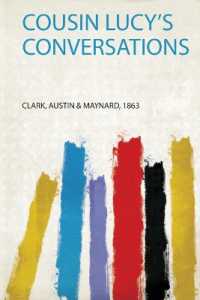- ホーム
- > 洋書
- > 英文書
- > Literary Criticism
Full Description
Victorian Contagion: Risk and Social Control in the Victorian Literary Imagination examines the literary and cultural production of contagion in the Victorian era and the way that production participated in a moral economy of surveillance and control. In this book, I attempt to make sense of how the discursive practice of contagion governed the interactions and correlations between medical science, literary creation, and cultural imagination. Victorians dealt with the menace of contagion by theorizing a working motto in claiming the goodness and godliness in cleanliness which was theorized, realized, and radicalized both through practice and imagination. The Victorian discourse around cleanliness and contagion, including all its treatments and preventions, developed into a culture of medicalization, a perception of surveillance, a politics of health, an economy of morality, and a way of thinking. This book is an attempt to understands the literary and cultural elements which contributed to fear and anticipation of contagion, and to explain why and how these elements still matter to us today.
Contents
Introduction
Theorizing Contagion: The Uses of Contagion in Victorian England
Verbalizing Contagion: Edwin Chadwick's Narratives and the Rise of Public Health Governance
"All Smell is Disease": Medical Realism in Charles Dickens's Narratives of Sanitation
Serial Outbreaks: Florence Nightingale and the Narrative Practice of Nursing
From Imagined Community to Imagined Immunity: Medical Realism in Elizabeth Gaskell's Novels
Aesthetics of Sanitation and Social Practice in Dickens's Novels: Prostitution and Moral Politics of Contagions
"A Clean City is a Healthy City": Normativity and Contagions in Victorian Slum Narratives
Victorian Materials and Rubbish Theory: Charles Dickens and the Recycling of Society in Our Mutual Friend
Conclusion
-

- 電子書籍
- お父さん、私アイドルだったんだよ。1
-

- 和書
- 近代文学史必携




